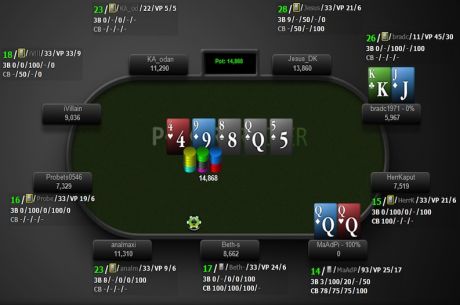Defending Your Blinds Versus a Steal

If you play tournament poker on a regular basis you need to learn quickly how to defend your blinds, because they are going to come under attack from late position openers more than you would care to imagine.
Defending against a steal attempt is one area with which many poker players struggle, mainly because they either do not defend enough and have their stacks eaten up by their aggressive opponents, or they defend too liberally and have to play the rest of the hand out of position with what is often a relatively weak holding.
Finding the perfect balance of calling, folding, or reraising from this position comes with experience and can take some time to learn. Hopefully by the time you have finished reading this article you will have more knowledge about the art of defending your blinds.
For the most part, three-betting a steal attempt is going to be preferred over calling and hoping to connect with the flop. While the latter is a viable option in some cases, more often than not you��re going to be left holding a weak hand while also playing from out of position and without the initiative in the hand. That last point is important because having the initiative in the hand �� in the form of being the aggressor �� gives you many more options postflop and makes your life much easier in the long run.
Let��s consider the situation further by making cases for both three-betting and calling when you��re facing a steal attempt.
When to Three-Bet a Steal Attempt
Responding to a steal with a reraise should be your default line. If your hand is strong enough to play out of position then it should be strong enough to three-bet.
Obviously, the main reason to three-bet would be for value because you have a strong hand. Holding hands such as K?Q?, 10x10x or better, or A?Q? when facing a steal should mean a mandatory reraise. You can also widen your three-betting range if your opponent is stealing with a wide range of hands.
The next couple reasons for three-betting are all player specific, so you will have either had to make some notes on your opponents�� tendencies, be using a HUD (Heads-Up Display) if playing online, or have a great memory.
If your opponent folds to a lot of three-bets �� which means the player is stealing with a wide range of hands �� then feel free to three-bet until the cows come home. Facing an opponent who folds a lot preflop after opening the betting means you can three-bet with a much wider range of hands than you normally would.
Likewise, if your opponent often calls a three-bet but then plays fit-or-fold on the flop, you should be three-betting and then continuation betting most flops to take the pot away from him.
Finally, make a note of what sort of hands your stealing opponent has when calling reraises. If they are hands that are easily dominated such as A?3? and J?8?, then start three-betting with hands that would dominate that range like A?9? or Q?J?.
When to Call a Steal Attempt
Although I��d advocate three-betting the majority of the time you��re going to defend against a late position steal attempt, there are times when calling could be the correct play.
One example of a good time to call instead of three-betting would be if you had a powerhouse hand such as A?K?, K?K?, or A?A? and the stealer has been folding to a high percentage of reraises. In this spot you can call to keep your opponent in the hand, then try to extract some value postflop.
Another reason to call would be if you��re playing deep-stacked and hold something like a small or medium pocket pair or a suited ace where the potential to flop an absolute monster is there, but at the same time you don��t want to be bloating the pot with the weaker part of your range while being out of position at the same time.
A third reason to defend with just a call would be if your opponent steals frequently but then calls a lot of three-bets. Here you probably don��t want to three-bet unless you have a solid hand, but you still want to get into the pot with an opponent who is opening wide.
Playing out of the blinds against a steal can often be tricky, yet it can also be a profitable proposition. Try and take the preflop initiative as often as you can if you��re going to defend your blinds, but ensure that you have notes or a read on the person trying to steal from you to help avoid slip-ups after the flop.
Get all the latest PokerNews updates on your social media outlets. Follow us on Twitter and find us on both Facebook and Google+!








